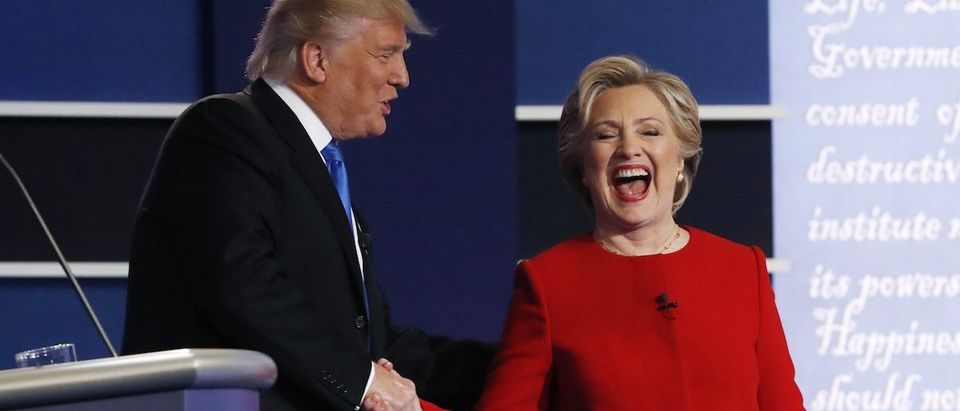Hillary Clinton supporters, including much of the mainstream media, were smacking their lips after last night’s first nationally televised presidential debate between Hillary Clinton and Donald Trump.
The consensus? Clinton won the debate handily. CNN did an instant poll after the event which found that 62% of respondents thought that Clinton prevailed, while only 27% thought that Trump did.
But, in fact, the debate was far from conclusive. For one thing it turns out that the base of CNN’s polling was skewed: More Democrats watched the debates than Republicans, and CNN made no effort to “weight” its sample appropriately.
Even so, only a small percentage of those polled said that the debate helped them make up their mind. Nearly half said it had no effect at all. Among those that said it did affect them, Clinton had an edge, but it wasn’t a large one – and with the skew, the real effect may have been negligible.
In a separate CNN-commissioned focus group, just 4 of the 20 participants felt that the debate had convinced them to vote for Clinton. Most of the remaining 16 were still undecided, though it appeared that several might have been tilting toward Trump — but on camera, were reluctant to raise their hands.
The debate actually felt like two contests. During the first half hour, which focused on the present and future state of the economy, Trump clearly edged Clinton on points. Clinton offered the same stale defense of her liberal tax-and-spend policies while Trump made a strong case for new tax incentives for businesses to induce them to reinvest in America.
In fact, whenever the debate focused on real issues – including whether New York’s “stop and frisk” policies reduced urban violence, which they did – Trump generally bested his Democratic rival.
But when Clinton was able to shift to Trump’s tax records, past support for “birtherism,” or questioned his attitudes towards women, she seemed to regain the upper hand. On foreign policy, including how to handle ISIS, or the wisdom of the Obama administration’s deal with Iran, Clinton did her best to disparage Trump’s basic knowledge of statecraft, but the results were inconclusive.
Probably the biggest surprise of the night was Trump’s failure to go on the offensive over Clinton’s honesty and trustworthiness, including her handling of her email server and her pay-to-play activities with the Clinton Foundation — a huge tactical error, perhaps, and a major disappointment to his supporters.
The one time he did attack – lambasting Clinton’s top aides for “taking the fifth” to avoid prosecution — he scored. Clinton had nothing to say in reply other than to repeat her now familiar defense that the private email server was a “mistake” and she wouldn’t do it again.
Trump countered that it wasn’t a mistake, but an act of deception, but he let the matter drop and Clinton escaped with little more than a flesh wound. With Clinton clearly on the defensive with voters, and new email revelations appearing almost daily, even post-debate commentators seemed surprised at Trump’s reticence to exploit his advantage on this issue.
Throughout the debate moderator Lester Holt of NBC News tried to maintain the appearance of neutrality but intentionally or not, he seemed to tilt his questioning in Clinton’s favor. For example, he failed to raise a single question about Clinton’s email travails and yet he insisted on resurrecting the “birther” issue and challenging Trump on the question of whether he had supported or opposed the Iraq war.
There were aspects of the debate, optically, where Clinton seemed to lose points. She often adopted the demeanor of a schoolmarm, smugly referring viewers to her website “fact checkers” who apparently were “scoring” Trump’s remarks as if he were a petulant dunce. When Al Gore adopted a similar stance against George W. Bush in 2000, though, it was widely perceived as an error.
Clinton also insisted on calling Trump “Donald,” with an air of condescension while Trump referred to Hillary as “Secretary Clinton.” Trump was respectful, even as he attacked Clinton’s policies. Clinton, by contrast, used the word “crazy,” shook her head, and implied that many of Trump’s positions were wild — instead of just different from hers.
In the end, the debate didn’t even cover some of the most important issues on the domestic front, including Obamacare and immigration. But Trump might have raised these issues himself and exploited them to his advantage — an important lesson moving forward.
A fairer assessment of the debate? It was a draw. Trump, who has never debated in this setting with these kinds of stakes, showed up and more than held his own. In the second half of the debate, he too often let himself get baited and trapped by Clinton. As a result, he was unable to shine as consistently as he might have.
Still, if Clinton had hoped to knock Trump down and regain her lost campaign momentum, she utterly failed. Trump, against all odds, managed to hold his own – and then some. And for a surging challenger facing an establishment politician in a “change” election, that’s probably all that matters.


